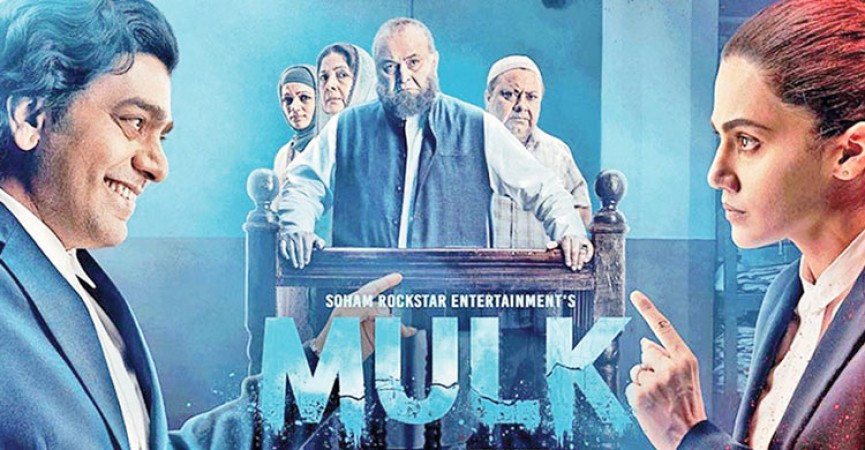
The meeting point of religion and art has always been a captivating theme in the rich tapestry of Indian cinema. Bollywood in particular has frequently used its films to examine the complexities of religious diversity, interfaith harmony, and societal prejudices. Anubhav Sinha's 2018 Indian drama "Mulk," which features a religious Muslim scholar, is one such film that attracted attention for its thought-provoking plot and inclusion of such a figure. This article explores the fascinating tale of how a religious Muslim scholar from Malihabad was instrumental in overseeing the Muslim rituals portrayed in the movie, as well as the wider implications of this collaboration.
Anubhav Sinha's film "Mulk," which is directed by him and features veteran actor Rishi Kapoor, examines the difficulties of religious identity and intercommunal harmony in modern India. A Muslim family, led by Murad Ali Mohammed, played by Rishi Kapoor, is the focus of the film. After one of their members is falsely accused of terrorism, the family must fight to prove their allegiance to the country. A potent and timely work of cinema, the movie tackles issues of religious tolerance, social prejudice, and what it means to be Indian.
For a very long time, cinema has served as a medium that captures the culture of its setting. It is not surprising that religion frequently takes centre stage in storytelling in India, a country where diversity is the norm. Religious stories have been incorporated into films to produce gripping and thought-provoking tales that connect with viewers all over the nation. "Mulk" is no exception; it makes use of religious identity as a key plot point.
An important factor in making "Mulk" genuine and respectful of the Muslim community was the participation of a religious Muslim scholar from Malihabad. This obscure scholar was consulted to make sure that the depictions of Muslim rituals and practises in the movie were sensitive and accurate.
The religious expert was crucial to several plot points in the movie:
Authenticity: The scholar provided the filmmakers with guidance on various facets of Islamic practises to make sure the Muslim rituals that were portrayed in the movie were accurate. This included instructions on prayer customs, dietary requirements, and cultural details that needed to be accurately depicted.
Cultural Sensitivity: The scholar also assisted the filmmakers in navigating the complexities of Muslim culture, emphasising the value of being sensitive to other cultures when portraying Muslim characters and their way of life.
Religious etiquette: The scholar emphasised the need to depict religious practises and interactions in a respectful and accurate way given the film's themes of communal harmony. To prevent misrepresentation and potential backlash, this was essential.
Language and Dialogue: The scholar played a crucial role in making sure that the Arabic verses from the Quran that were used in the movie were recited correctly and with the correct pronunciation, as mistakes in this area could have been extremely offensive to the Muslim audience.
The Malihabad-based religious scholar's participation in the project had a big impact on the movie:
Authenticity and Credibility: The film had a high level of credibility and authenticity due to the careful attention to detail regarding Muslim rituals and practises. Muslim viewers connected with this authenticity, which gave the characters and their cultural backgrounds more nuance.
Interfaith Peace: "Mulk" is a movie that advocates interfaith peace and shows Muslims as an essential component of Indian society. The film's overall message of unity in diversity was furthered by the scholar's direction, which made sure that Muslim characters and their faith were depicted in a respectful and accurate manner.
Acclaim from the critics: "Mulk" was well-received by critics for both its compelling storytelling and its delicate treatment of religious themes. A key factor in achieving this balance was the cooperation with the religious scholar.
Impact on Society at Large: The movie's message of religious tolerance and unity had an impact on society at large, igniting discussions about the significance of understanding and respecting various faiths in India's multifaith society.
"Mulk" is a shining example of how Bollywood can make the most of its considerable influence to encourage interfaith harmony and accurately represent religious diversity. To ensure that the movie resonated with authenticity and respect, a key step was to involve a religious Muslim scholar from Malihabad in overseeing the Muslim rituals and practises. Such partnerships serve as a reminder of the power of cinema to bridge the gaps between communities and promote understanding in a country as diverse as India, where religion frequently plays a crucial role in people's lives. The tale of the cleric's involvement in "Mulk" is more than just a behind-the-scenes anecdote; It is evidence of how films can improve society and promote peace in a world that is becoming more and more diverse.
Alia Bhatt Shines in Imtiaz Ali's Digital Odyssey, 'Highway'
Rishi Kapoor's Surprising Transformation: From Romantic Hero to Villain in 'Kal Kissne Dekha'
Mumtaz Askari's Journey from Skepticism to Stardom in 'Loafer' (1973)